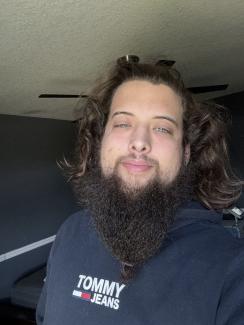When you ask 23-year-old Carson to introduce himself, the conversation gets very real, very fast. “My life is on pause until I get a kidney. I’m too sick to do anything,” he said. Four years ago, Carson was a healthy teenager who was planning to enlist in the Army. Then, in February 2020, he was diagnosed with kidney disease. To save his life, a transplant is his only option.
Now, Carson spends his days playing video games… and waiting. At night, he administers his own dialysis. “It takes about nine hours every night. Sleeping with a leash attached to your stomach is hard,” he said. “I wake up every morning feeling nauseous.” He can’t run, swim or do anything fun outdoors anymore.
In high school, Carson was very active, playing basketball, baseball and running track. Then, his health suddenly changed. “I got sick like I never had been before,” he said. “I was super dehydrated. I thought it was COVID because it happened around the same time.” After spending a week in bed, Carson went to the hospital where doctors discovered that scar tissue had developed on the parts of his kidneys that filter blood. The disease is called focal segmental glomerulosclerosis, or FSGS, and many times there’s no known cause. “It had evidently been happening for a long time,” says Carson. “If I had symptoms, I was too young and healthy to notice.” Carson was referred to UT Medical Center, under the care of nephrologist Dr. Urath Suresh, where he learned he would eventually need dialysis and a kidney transplant. “In May 2020, I was told everything about the transplant process, how it’s done and what to expect,” Carson said.
While waiting for a kidney, Carson continued working at a mobile phone store. After initially putting off starting dialysis, he knew it was time when he became too ill to enjoy his 21st birthday trip to Las Vegas. He called UT Medical Center from that trip, and surgery was scheduled in early December 2021 to place the peritoneal dialysis catheter in his abdomen.
After that, Carson’s kidney disease began to impact every aspect of his life. “I didn’t really come to terms with my diagnosis until I started dialysis,” he said. He took three months off from work and eventually was laid off. The situation continued to repeat as he worked off and on as a restaurant server. “At my last restaurant job, I threw up on my way to the bathroom during a rush,” he said. “That’s when I realized I was too sick to work at all.”
Carson and his UT Medical Center transplant team, led by Dr. Oscar H. Grandas, remain hopeful, especially with greater awareness about organ transplants during April, National Donate Life Month. However, according to the United Network for Organ Sharing, nearly 104,000 people currently need a life-saving transplant. Because of a shortage of suitable organs, only about 50% of those on the waiting list will get an organ within five years. “Your life is on pause when you’re young with something like this,” Carson said. “I’d never have believed it if you’d told me in high school that I would be this way, but here it is.”
Carson, we appreciate you sharing your story with such honesty, and thank you for helping us increase awareness about organ donation. If you would like to learn more about becoming a life-saving living kidney donor, contact Living Donor Coordinator Lanny Martin at the Center for Transplant Services at [email protected] or call 865-305-5340. And please share this story to spread the word about Carson and others waiting for organs.
